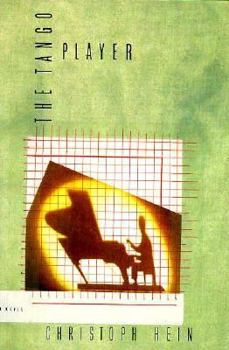The Tango Player
Select Format
Select Condition 
Book Overview
Set in 1968 Leipzig, Christoph Hein's novel is the story of Dallow, an apolitical academic who has just returned to civilian life after serving twenty-one months in prison. His crime: he was the... This description may be from another edition of this product.
Format:Hardcover
Language:English
ISBN:0374272522
ISBN13:9780374272524
Release Date:January 1991
Publisher:Farrar Straus Giroux
Length:219 Pages
Weight:0.74 lbs.
Dimensions:0.8" x 5.3" x 7.8"
Customer Reviews
2 ratings
The World of Shallow Dallow
Published by Thriftbooks.com User , 16 years ago
This is a sad book. There are no heroes, only a grey world, a place where politics has wiped away the character of humanity. The main character, Dallow, moves around in the novel devoid of emotion, of feeling, compassion and sensitivity. He is the void of the GDR personified, engaging in loveless relationships, relating only on the superficial level. There is a Kafka-esque humor in the book when the reader encounters the two government officials. They are consistently indistinguishible, a Tweedle-Dee and Tweedle-Dum pair who harass Dallow into getting back into his old career path following his prison release. ("I was just the Tango player" he constantly reminds the reader). Strangely enough, this book was written about a time that could be now. Dallow is only physically engaged in his various sexual encounters. He is isolated from others, his relationship with his parents pointless and weary. In our time and place, we have ipods and cell phones to isolate us. Tear back the layers of our digital distractions and we'll find Dallow in our modern world. This book is haunting if you can stand back and see how it compares to our new century.
"Disgrace" in Communist East Germany
Published by Thriftbooks.com User , 24 years ago
Why should one read books about a political system that is dead and gone? The answer is, of course, that it is not so dead and gone after all. Communism may have collapsed as a political force, but the countries of eastern Europa are still full of the people it has created. People who have just been released from prison are like an ownerless dog, Hein's narrator says, constantly looking for a new master to caress and beat them. Maybe that is how quite a lot of people feel after the Iron Curtain has come down... Peter Dallow has just been released from prison in the East Germany of 1968; he had played the piano in a political cabaret, and a tango about the ageing ruler of the country had so infuriated the authorities that all members of the group are sentenced to spend two years in prison. Dallow still feels he was innocent, because he wasn't even a member, he had just stepped in for the man who usually played the piano. Hein's book is about the months after Dallow's release from prison. The mood is similar to the one in Coetzee's "Disgrace": Dallow used to be a lecturer at Leipzig university, and his attitude towards his students seems to have been one of contempt and cynicism. Now he is in a state of disgrace, people feel uneasy in his presence and want to get rid of him. The Communist state, however, will not let go of him: The authorities, the secret service, the police, are annoyed that Dallow does not want to live on as if nothing had happened. Nobody could escape the system, no matter how hard he or she tried. Actually they keep trying to force Dallow to return to his post at the university. Maybe people like him are even more useful for a dictatorship than those who never got into trouble: Dallow is broken and cynical, he will never resist the government again; in contrast to practically all the people around him he is completely indifferent towards the hope for reform embodied in the Prague Spring. Dallow's perspective offers a shocking picture of the state of human relationships in his country: Here too cynicism abounds. Love is only mentioned once - as an impossible dream. Sex is regarded as a purely physical need ("I feel like having sex with you."), and young girls gladly trade it for a place to spend the night. People leave each other just like that. Most characters seem to be scarred after lost battles. This, of course, is Dallow's perspective, and he refuses to cherish any hopes at all. Maybe Hein wanted to show what East Germany was like without the hope for change. The book was first published in 1989, when this change was finally happening...






